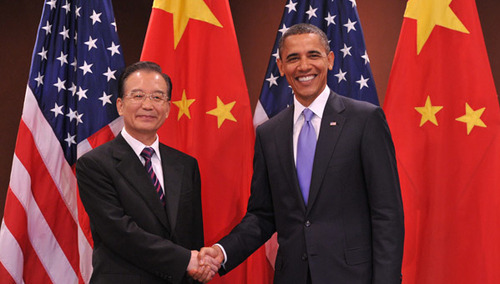
President Obama and his leading foreign policy advisors are attempting to engage the Chinese in a bilateral dialog on strategic reassurance, but with little success.
It’s not because of a lack of effort. The President regularly sends members of his Asian security team to Beijing to try to start a discussion on strategic security issues, principally space and nuclear weapons. The goal is to reassure China about U.S. strategic intentions, to obtain reciprocal reassurances from China, and to develop confidence-building measures to sustain U.S.-Chinese strategic reassurance over the long term. The Chinese leadership routinely placates the President’s emissaries with polite acknowledgement, but refuses to engage in serious talks.
Administration officials seem perplexed. Some wonder what message China may be trying to send the U.S. Some seem to see it as evidence that nothing the U.S. does can influence China.
What I’ve discovered in my discussions in China is that the real reason for this lack of engagement is both simpler and more complex than this.
There is a serious debate now taking place within the Standing Committee of the Politburo – China’s most powerful political body – about the nature of China’s security relationship with the United States. The nine-member Committee must come to a consensus on policies; China is no longer a state with a single powerful leader and a government that rubber-stamps his decisions.
There are currently two factions shaping the internal Chinese debate. One could be described as a “status quo” faction that does not seek major changes in the relationship with the United States. It sees the U.S. as a benign power supporting an international system that is conducive to continued Chinese economic, scientific, and cultural development – despite longstanding contentious, but manageable, disagreements on Taiwan, trade, and human rights.
The other faction, which is less cohesive but more bellicose, believes the United States feels threatened by China’s rapid development and that the U.S. is seeking to contain and constrain it in a variety of ways, including aggravating disputes between China and its neighbors and limiting Chinese access to resources, markets, and technology. These diffuse but potentially volatile anxieties are being employed by a variety of anti-status quo political personalities in the broader internal struggle over China’s future – and the future of the Chinese Communist Party – that is animating the upcoming transition to a new Chinese administration.
The split between these factions within the Committee has led to deadlock. Until the Committee comes to a decision, Chinese officials do not have a policy to guide engagement with the United States. So they are in a holding pattern that is reflected in their interactions with their U.S. counterparts.
U.S. officials should not be surprised by the feelings of distrust toward the United States. Over the past several decades the United States pursued policies that some members of the Chinese leadership found threatening.
For example, on space policy, U.S. defense publications suggested the United States intended to dominate space and dissuade China from competing there. The U.S. refused to engage in substantive discussions on the peaceful use of outer space in the Conference on Disarmament in Geneva. It isolated China from the international space community, kept China out of the international launch services market and turned a cold shoulder to Chinese overtures to participate in the International Space Station.
On nuclear weapons policy, the U.S. listed China as a possible target of U.S. nuclear weapons and shifted the bulk of America’s submarine-launched nuclear-armed missiles to the Pacific. It called for developing systems to track and target mobile missiles. It withdrew from the ABM Treaty, deployed long-range ballistic missile defense interceptors in Alaska, and began developing ship-based interceptors with Japan. It signed a nuclear energy agreement with a nuclear-armed India that appeared to strengthen its ability to produce fissile materials.
While the Obama administration has deliberately taken a different approach to China, from China’s perspective recent U.S. strategic decisions that impact China are not reassuring.
While attempting to engage China on strategic reassurance, President Obama’s Asia hands are also working to shore up U.S. alliances with Japan, South Korea and the member states of the Association of South East Asian Nations (ASEAN).The Obama administration views the reinvigoration of U.S. alliances in Asia as essential to promoting regional stability and prosperity; a confidence building measure for nations who are concerned about the growth of Chinese economic, diplomatic and military influence in the region. China’s security establishment views alliance building as exclusionary: an expression of deference to the interests of friends at the expense of the interests of non-friends.
Unfortunately, military posturing over unresolved sovereignty claims between China and its neighbors is taking center stage. U.S. military exercises, combined with new U.S. statements of concern about longstanding Chinese sovereignty claims are strengthening the credibility of the minority of Chinese political leaders who believe the United States is seeking to contain China.
One interesting aspect of the larger situation is that – rather than showing that the U.S. has little ability to influence Chinese decisions – it illustrates how U.S. policies can have a very significant effect on Chinese decision-making.
China’s internal political debate over the fundamental character of its relationship with the United States is unlikely to produce a consensus during a period of domestic political transition, since China is in the process of choosing new leaders. In the absence of consensus, meaningful engagement with the United States on strategic reassurance is too high a bar for China’s security establishment to clear. Their U.S. counterparts are understandably tired of waiting for China to come to the table.
Fortunately, Secretary of State Clinton is reported to place great stock in German philosopher Max Weber’s characterization of politics as “a strong and slow boring of hard boards.” She should impress that wisdom on her colleagues in the Pentagon and begin to craft less ambitious objectives with policy options that encourage China’s emerging new leaders to place greater faith in the good intentions of the United States.
